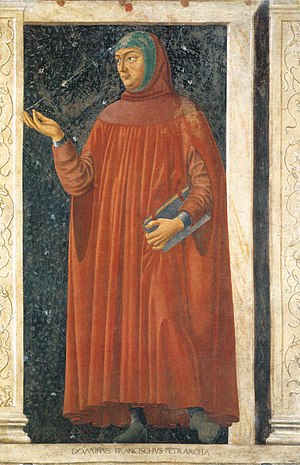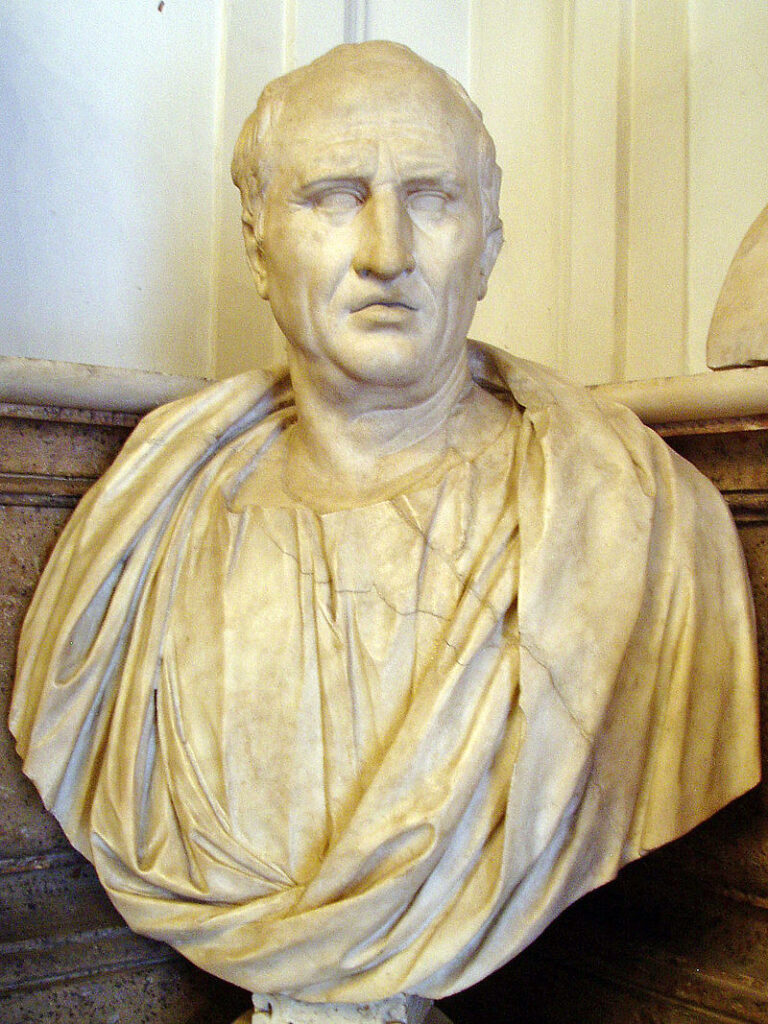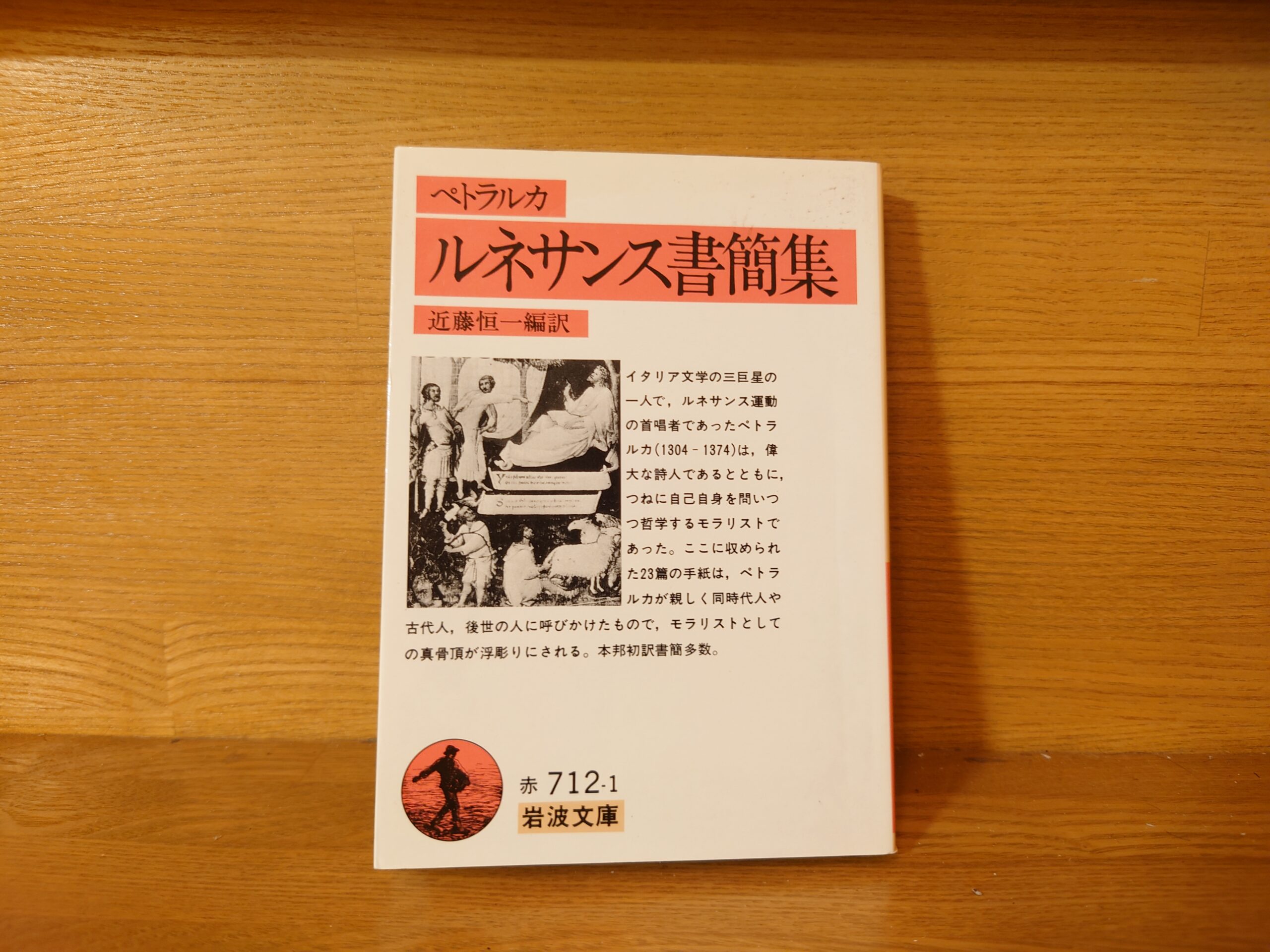Overview and Comments on Petrarch's "Renaissance Letters" - The letter to Cicero is just hilarious! What is the love of literature and humor of one of the most important literary figures of the Renaissance?
The book introduced here is "Renaissance Letters" written by Petrarch and translated by Kondo Tsunekazu, published by Iwanami Shoten in 1989.
Let's take a quick look at the book.
Petrarch (1304-1374), one of the three great stars of Italian literature and a leading figure of the Renaissance movement, was not only a great poet but also a moralist who constantly questioned himself and his philosophy. The 23 letters in this volume, which Petrarch intimately addressed to his contemporaries, the ancients, and posterity, bring out the true essence of the moralist. Many of the letters are translated for the first time in this country.
AmazonProducts Page.
I picked up this book by Koji Kuwakino in my previous articleRenaissance: The Age of the Information Revolution.was the catalyst.
I was very interested in the part of the book that describes Petrarch, the man who started the Italian Renaissance, and I was very interested in learning more about him.

Since we are here, I would like to introduce here a part of the book "Renaissance: The Age of the Information Revolution" that describes Petrarch. It is a bit long, but I am sure you will be interested in Petrarch if you read it. Let's begin.
Petrarch is considered the father of Renaissance humanism. It was in the middle of the 14th century that he was most productive in his thought and writing. Even at that time, some of Cicero's oratorical and moral philosophical works were well read among literary enthusiasts. These texts reveal a philosopher with a strong mentality and ethical sense, a perfect orator who chastises evil and corrects injustice. Moreover, he is the greatest master of classical Latin, a writer who never ceases to gnaw at the heart of the reader's lungs and inspire the spirit, so it is no wonder that a young genius with a keen literary sensibility became enamored with his work.
Petrarch, who had already made a name for himself at the age of twenty-four by producing a precise comparative revision of the manuscript of Livius' History of the Founding of Rome, rediscovered in Liege in 1333 a manuscript of Cicero's oration "In Defense of the Poet Marcius," which had been unknown in the Middle Ages. As we have seen in the previous chapter, this work can be read as a kind of praise of literary studies, which develops in the name of a defense of the poet. The young scholar, instantly enthralled by this work, came to hold up as an ideal the "study of the humanities" as a new discipline for the age to come.
More than ten years later, in 1345, something happened that shook Petrarch. He personally rediscovered the collection of Cicero's letters, which had been kept in the archives of the Cathedral Counsellorate in Verona. The collection was a vast collection of private correspondence, including sixteen volumes of "Letters to Attikus," known as the "Letters to a Kindred Friend. A bundle of never-before-seen letters from the master of his heart whom he adored so much. I am sure that he must have flipped through the pages with trembling hands, overjoyed. But then...
The man who speaks to us through his unadorned writing is not a key figure of the state or a leading philosopher in the world of thought, but a poor man at the mercy of the turbulent political situation at the end of the Republic, with no hands to help him. He was an indecisive, anxious about money, heartbroken and weak over the separation from his family and relatives and the emotional discrepancies between them. The joy of finding the letter must have been immediately doused with cold water, and the hand that was reaching for it must have begun to tremble in a different way. Who are you, Cicero?
Unable to resist, Petrarch took up his pen and wrote a letter of rebuke and exhortation to the poor old man (June 1345). The pen is very sharp in its condemnation of the "frivolous and frivolous old man," who, lacking the ability to make sound judgments, was so eager to get involved in political disputes that fate played tricks on him and he was left to die a slow and miserable death. But at the same time, it was the reverse side of his deep respect for him. Six months later, while apologizing for the rudeness of his previous letter, which was written in a fit of emotion, he expressed his thoughts on Cicero's genius and reported on how his writings were conveyed to future generations.
Petrarch also sent similar hypothetical correspondence to eight other prominent ancient writers, including Seneca, Horatius, and Vergilius. It is needless to say that these sentences are literary creations written with the intention of being read by others. Yet, in his lively dialogues with the ancients, we can sense the solid momentum of Renaissance humanist culture, which regarded the classics as living subjects and sought to use ancient culture as a source of new creative energy.
The numerous works discovered and revised by Petrarch were quickly disseminated in manuscript form among literary circles, fostering new momentum for the discovery of new classics among the public.
Chikuma Shobo, Koji Kuwakino, Renaissance: The Age of the Information Revolution, p. 116-118

Petrarch took the unusual step of sending a letter to Cicero, the great man of ancient Rome.
But if you think about it, this leads to the fundamental question, "What is reading?
Petrarch was not just memorizing what was written in a book; he was interacting with the author.
More specifically, they were reading as if they were conversing with a "living person" through the words written in books. This may sound obvious, but I think it strikes at the heart of the "attitude toward reading. Reading a book is a dialogue with the author, a serious game. It is not just about cramming knowledge into a book; it is a test of what you think about it and how you will apply it to your life in the present.
Author.In his lively dialogues with the ancients, one can sense the solid momentum of Renaissance humanist culture, which regarded the classics as living subjects and sought to make ancient culture the source of new creative energy.It was also a strong nod to state that
I felt from this passage that the Renaissance was a movement to revive such ancient wisdom in the modern world and create a new world.
And in the quote above,
The man who speaks to us through his unadorned writing is not a key figure of the state or a leading philosopher in the world of thought, but a poor man at the mercy of the turbulent political situation at the end of the Republic, with no hands to help him. He was an indecisive, anxious about money, heartbroken and weak over the separation from his family and relatives and the emotional discrepancies between them. The joy of finding the letter must have been immediately doused with cold water, and the hand that was reaching for it must have begun to tremble in a different way. Who are you, Cicero?
Unable to resist, Petrarch took up his pen and wrote a letter of rebuke and exhortation to the poor old man (June 1345). The pen is very sharp in its condemnation of the "frivolous and frivolous old man," who, lacking the ability to make sound judgments, was so eager to get involved in political disputes that fate played tricks on him and he was left to die a slow and miserable death. But at the same time, it was the reverse side of his deep respect for him. Six months later, apologizing for the rudeness of his previous letter, he expressed his thoughts on Cicero's genius and reported on how his writings had been conveyed to future generations.
I was intrigued by the author's statement, "I am not a fan of the "one" type of work, but I am a fan of the "one" type of work.
I wonder what the actual letter was like. I would love to read them!
This is why I picked up the current work, "Renaissance Letters.
The letters in question appear on pages 142 through 155 of the book; the first letter is on pages 144-147 and the second on pages 148-155.
Petrarch frankly laments to Cicero in the first letter. And it was interesting that the second letter, which follows it up with an obviously longer one, seemed more realistic.
Let's take a look at the letters. This is the first letter. This is the first letter written by Francesco Petrarca after the shock of discovering Cicero's private manuscript.
To Marcus Tullius Cicero.
Dear Cicero, Francesco sends his greetings. I found unexpectedly your collection of letters, which I have been seeking for a long time, and I devoured it. I have been able to listen to you talk a lot, lament a lot, and even change your mind. I had already known for some time what a teacher you are to others, but now I finally understood what a teacher you are to yourself.
Therefore, Cicero, wherever you are now, hear my words, which you now utter in true affection. It is no longer advice but lamentation. It is the tearful lamentation of one of your posterity who is devoted to you.
Oh, always restless and anxious man. Or, if you recall your own words, "Oh, frivolous and unhappy old man. What in the world did you want to get yourself into the middle of so many quarrels and futile disputes? Where have you abandoned the free leisure time that is appropriate to your age, work, and circumstances? Blinded by what false glories, you have been dragged into the fray of youth and youth in your old age, and by the vagaries of various fates, into a death that is unbecoming of a philosopher. Oh, forgetting the advice of your brothers, forgetting your own useful lessons, as if you were a traveler in the night, carrying a light in the darkness, showing the way to those who followed you, while you yourself miserably stumbled and fell on your own path.
I will not mention Dionysius. I will not mention your brother or nephew. If you wish, I will not even mention your daughter-in-law Dravella. You sometimes praise them to the heavens, and then suddenly abuse them to the point of hurting them. Perhaps you can still put up with this. I will also close my eyes to Julius Caesar. Caesar's generosity was guaranteed, and he was a refuge for his adversaries. And keep quiet about the Great Bompeius. You were especially close to him, and it seemed to him that you would be forgiven for anything you did.
Iwanami Shoten, Petrarch, translated by Tsunekazu Kondo, The Renaissance Letters, p. 144-145
Quoted above is the first half of this letter. I will omit the second half, but this alone should give you some idea of the atmosphere.
I laughed at the last part of this passage.
I will not mention Dionysius. I will not mention your brother or nephew. If you wish, I will not mention your son-in-law, Dorabella.
Petrarch, you're talking crazy (laughs).
I'll even turn a blind eye to Julius Caesar."
Furthermore, I will keep quiet about the Great Bompeius."
I have no intention of keeping silent anymore (laughs).
Petrarch writes these humorous letters to Cicero, an ancient Roman whom he admires.
And in the next letter, he said, "I am sorry, I have said too much. I know you as a human being have had your faults and hardships, but your achievements are still great. I respect your achievements. The way he follows up is also very witty and shows Petrarch's intelligence.
There has been a trend in the world to regard ancient philosophers such as Cicero and Aristotle as deities and revere them as absolute beings. However, Petrarch dares to see these philosophers as human beings just like us. Petrarch's sarcasm toward Cicero is unrelenting, but it is a sarcasm that comes only from love. We can sense his desire to treat Cicero as a human being whom he respects, rather than to worship him as if he were a god.
This may seem obvious to those of us living today, but it was a very revolutionary idea at the time.
One can only be surprised at Petrarch's exquisite humor in rejecting the trend of regarding ancient philosophers as divine absolutes.
I hope you will pick up this book and read the rest of the first letter and the second one as well. I think you will be surprised by Petrarch's wit and humor. It is also a very useful work for thinking about what the Renaissance was all about.
The above is "Petrarch's "Renaissance Letters" Letter to Cicero is just funny! What a love of literature and humor from one of the leading literary figures of the Renaissance".
Next Article.
Click here to read the previous article.
Related Articles







































